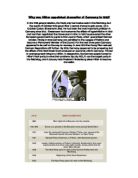Why was Hitler appointed chancellor of Germany in 1933?
In the 1928 general election, the Nazis only had twelve seats in the Reichstag, but the events of October 1929 gave Hitler a second chance to gain power. On 3 October Gustav Stresemann died. He had been the most important politician in Germany since 1923. Stresemann had overcome the effects of hyperinflation in 1923 and had then negotiated the Dawes plan in 1924. In 1925 he persuaded the other European governments to agree to the Locarno Pacts, which guaranteed German borders. Finally in 1926 Germany was admitted to the League of Nations and became a Permanent Member of the Council. For the next three years Germany appeared to be well on the way to recovery. In June 1929 the Young Plan reduced German Reparations still further. By 1929, Germany appeared to be prospering, but the effects of the Wall Street Crash produced an economic crisis in Germany. This led to unemployment rising to 6 million. In desperation, the German people turned to Hitler's Nazi party to solve their problems. By July 1932, it was the largest party in the Reichstag, and in January 1933 President Hindenburg asked Hitler to become chancellor.







